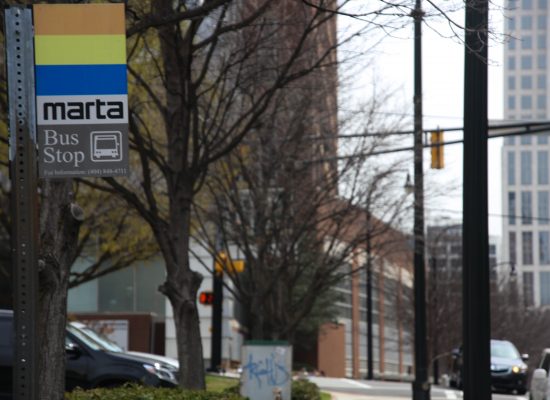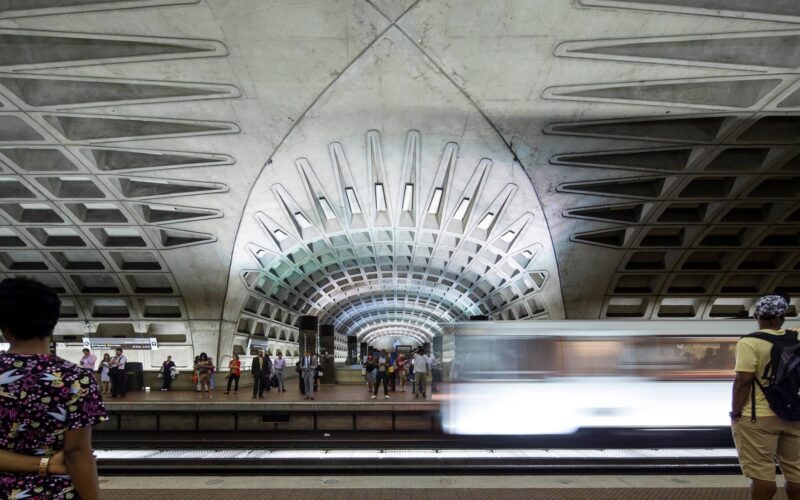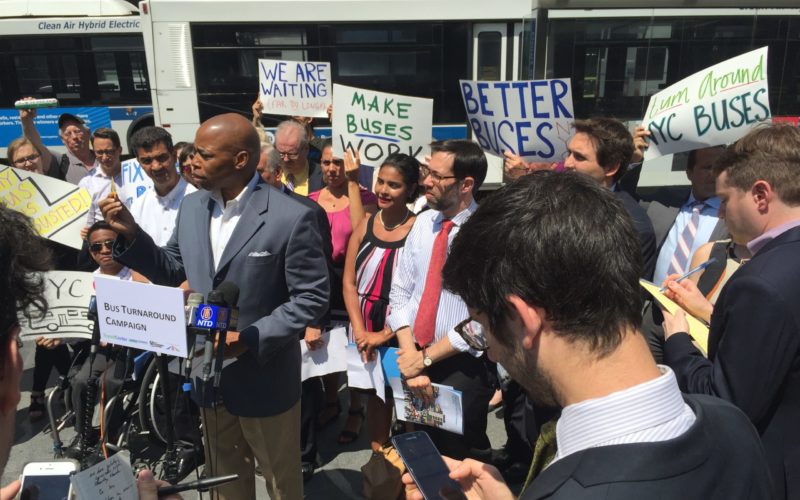

Photo credit: Paul Sableman (via Flickr). Used under a Creative Commons license.
This week, TransitCenter spoke with Binh Dam and Simon Berrebi about a new initiative pioneering unique forms of citizen engagement with Atlanta’s transit system—the MARTA Army. The group has recently received attention for mobilizing citizens to install self-produced bus timetables at stops across Atlanta’s vast bus network, and it’s not stopping there. The following is an abridged version of the interview, lightly edited for clarity.
What’s your one-sentence description of the MARTA Army?
We’re an all-volunteer organization creating and demonstrating citizen ownership of our transit system.
Why MARTA “Army”? How did you come by the name and idiom?
MARTA needs an army. The concept of it has been around for years, but during a discussion among transit supporters, a MARTA official opened the door to constructive action. He asked, “How can we make MARTA cool?” We said, “Leave it to us.” By coming at the system as riders and community members, we’ve been able to build a creative, scalable and memorable approach that departs from the usual arguments. Personal action by the soldiers to improve bus stops and the rider experience has made a splash and creates a different perception and even concept of transit.
Is the Army’s approach unique to Atlanta, or can others do it?
Other cities should be able to do it, and we have developed open source tools, a user’s manual and we’re making videos that can help with that. But our excellent working relationship with MARTA makes it work. The agency has devoted time and resources to helping us, we’ve met with and gotten to know MARTA’s officials, police officers and lawyers, to make our operation work with the needs of the agency and its parts. We also went to the recent TransportationCamp in Washington, D.C., and received a huge amount of interest from transit advocates there.
What does MARTA think?
Officials view our work as a potential game-changer. There are three specific benefits they see. One, actual practical changes like installation of bus timetables. Two, a new megaphone of public support for transit in Metro Atlanta—when the mayor sees a map with little flags indicating citizen donations of money for local transit improvements all over their city, there’s no way to dismiss transit as a special interest or say there isn’t support. Three, we’re helping MARTA innovate. MARTA’s allowance of our programs builds up support for the agency to step up its own game on signage, bus stop amenities, and in other areas. The MARTA Army is collecting data on the impact of our programs on ridership and experience.
Is there anything specific you can’t do? Were your actions negotiated?
It’s harder to do stuff in rail stations, but bus stops where MARTA only owns the sign pole are much easier. MARTA made the boundaries and the concerns they operate under very clear, and they were very open about communicating this.
Any good individual stories about the kinds of impacts you’re having?
One good example is a bus stop on Ponce de Leon Avenue: the pole there was severely bent for a number of weeks—probably hit by a car. Once a soldier had adopted the stop and installed a timetable on the bent pole, people started complaining about the state of the pole and a new one was installed a few days later. No one would’ve taken notice if the pole didn’t have one of our timetable signs.
And the press?
We’re getting tremendous strength from media coverage. It’s been an enormous amount—every radio station and paper in the region. And our positive message of citizen action has generated upbeat coverage for the Army and MARTA generally.
Are the soldiers having fun with it?
Oh yeah. All of our events are at bars. Soldiers come to more events because of the social nature of the group—to meet like-minded activists.
Are you active throughout the region? We know MARTA recently expanded into Clayton County.
Yes, the Army recently held an event there in connection with a soccer tournament, and a dozen new soldiers adopted bus stops. We have more events there coming up.
Any new projects coming up?
We’re working closely with city government on our next initiative. It’s a crowdfunded scalable set of additional bus stop amenities. The website will have a map of all of the Atlanta region bus stops. People can use it to donate money for amenities at particular stops. The donations have to hit a certain level to get a bench, and a higher level to get a shelter. The city will allow these to be installed (depending on suitability of the site) and has said it will maintain the new amenities.

A MARTA Army volunteer talks with other soldiers. Credit: Simon Berrebi
How is the MARTA employee nomination program going?
We’ve had quite a lot of nominations. We are holding an awards gala in the spring. We’ll be presiding in tuxes and gowns. It’s all very prestigious, and it’s possible that top MARTA top officials will attend.
Where does the Army go from here? What’s the connection from citizens installing bus schedules to better transit in the long run?
The organization is formally incorporating. We have a broad range of suggestions for future action coming in.
Earlier, we went around talking about “world-class transit” and that never got much traction. Where we hit a nerve was launching the hyper-local action of people installing timetables at their own bus stop. People in the Army care about transit, but improving it in their neighborhood is what gets them to act. We think we‘re a great example of “thinking globally, acting locally” or thinking regionally but acting in your neighborhood.
 On the Brink: Will WMATA’s Progress Be Erased by 2024?
On the Brink: Will WMATA’s Progress Be Erased by 2024?
The experience of being a WMATA rider has substantially improved over the last 18 months, thanks to changes the agency has made like adding off-peak service and simplifying fares. Things are about to get even better with the launch of all-door boarding later this fall, overnight bus service on some lines starting in December, and an ambitious plan to redesign the Metrobus network. But all of this could go away by July 1, 2024.
Read More A Bus Agenda for New York City Mayor Eric Adams
A Bus Agenda for New York City Mayor Eric Adams
To create the “state-of-the-art bus transit system” of his campaign platform, Mayor Adams will have to both expand the quantity and improve the quality of bus lanes. We recommend these strategies to get it done.
Read More